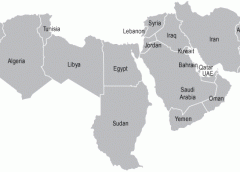
Despotism
Despotism, which spread, became widespread as though it was various contagious diseases. It is the form of government which uses unbalanced power against its people spatially to its opponents. These despotic regimes and the leaders tent to suppress their society in terms of political, ideological and social issues. This form of governments spread in the Islamic world specifically in the Middle East after the collapse of Ottoman Empire and withdraw of the Imperialist powers in the last century. Syria, Egypt, Libya, Tunisia, Yemen are some the examples of those despotism.
The key to Muslims’ happiness in the life of Islamic society is the mutual consultation enjoined by the Shari‘a. The verse, whose rule is consultation among themselves orders consultation as a fundamental principle.[1] The progress of the man kind and its nature needs and necessitates improving consultation among them. From this perspective, one reason for the backwardness of Asia, the largest continent, and Islamic world was the failure to practise that true consultation.[2]
The true consultation will help to remove those different forms of the suppressions and despotism, which “will loosen and remove the fetters and chains of the various forms of tyranny fastened to the feet of three hundred, rather, four hundred, million strong Islam.”[3] But it should not be miss understood that the true consultation is the Privy Council in which there would not be suppression and dictation, it should have the capacity of the representation of all groups. Clearly, the lawful freedom which, adorned with the customs and observances of the Shari‘a, will cast out the evils of dissolute Western civilization.[4]
The freedom born of the Shari‘a, which arises from belief, enjoins two principles; belief necessitates not humiliating others through oppression and despotism and not degrading them, and secondly, not abasing oneself before tyrants. Someone who is a true servant of God cannot be a slave to others. Do not make anyone other than God lord over yourselves. That is to say, someone who does not recognize God ascribes relative degrees of mastery to everything and everyone, and piles worries on his own head. For sure, the freedom, born of the Shari‘a, is a bounty of Almighty God through the manifestation of His Names of All-Merciful and All-Compassionate; it is a characteristic of belief.
“The importance of mutual consultation and its contribution to the life and progress of mankind, in particular Asia, and particularly Islam, can be achieved as follows: just consultation results in sincerity and solidarity, three ‘alifs’16 become one hundred and eleven. Thus, three men between whom there is true solidarity may benefit the nation as much as a hundred men. Many historical events inform us that as a result of true sincerity, solidarity, and consultation, ten men may perform the work of a thousand. Man’s needs are endless and his enemies innumerable, his strength and capital insignificant, and the number of destructive, harmful humans who have become like monsters through lack of religion are increasing. In the face of those endless enemies and innumerable needs, man can continue his personal life only through the support and assistance proceeding from belief, and can maintain
his social life only through the mutual consultation enjoined by the Shari‘a, that again proceeds from the truths of belief. It is only thus that he can halt his enemies and open up a way to secure his needs.”[5]
To be clear, one of the reasons of the underdeveloped Islamic world is the lacking of the true consultation. One may think that the real source of these despotic regimes is routed from Islam and Qur’an. However, Islam and Qur’an are not against mutual and true consultation. Indeed they are ordering to it to do. There are two main principles for Muslims: belief necessitates not humiliating others through oppression and despotism and not degrading them, and secondly, not abasing oneself before tyrants.
[1] Bediüzzaman Said Nursi, Demoascus sermon (tr.Şürkran Vahide), 56
[2] Ibid
[3] Ibid
[4] Ibid
[5] Ibid, 57

